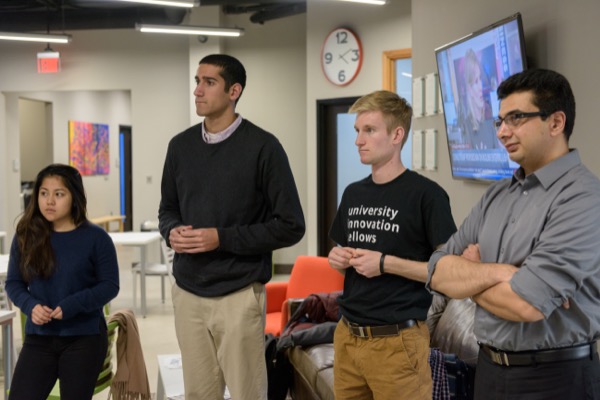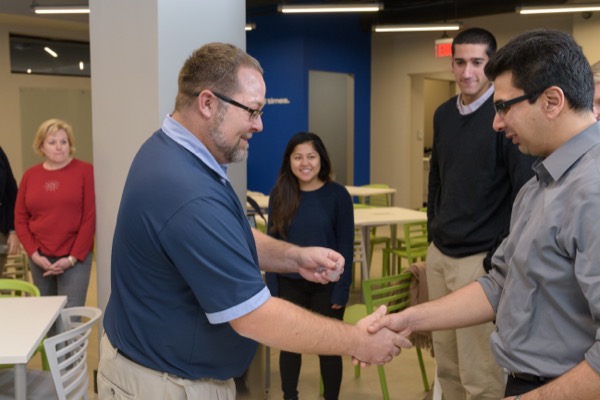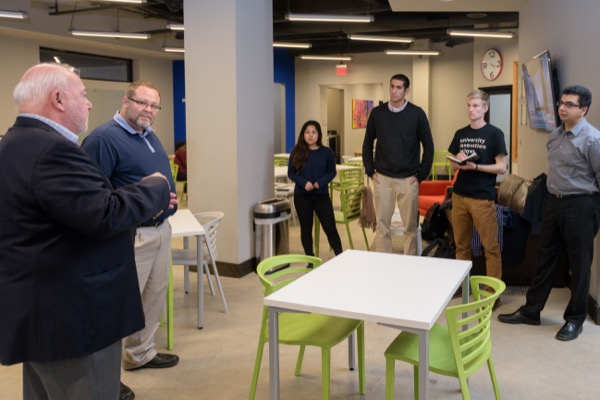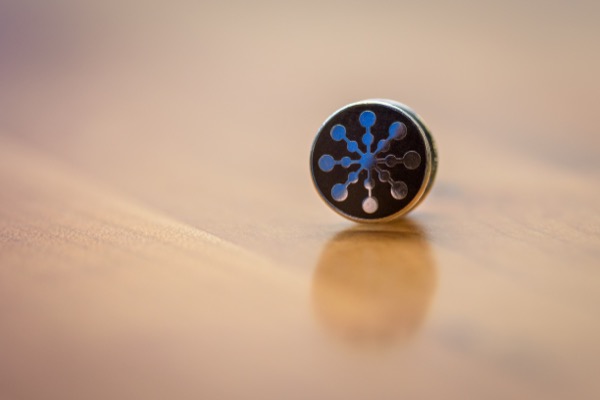


Innovation Fellows
Innovation Fellows program promotes entrepreneurship for everyone
10:59 a.m., Dec. 18, 2015--Most people think of Mother Teresa as a missionary not an entrepreneur, but her humanitarian work actually required her to have many entrepreneurial skills, including the abilities to sell her ideas, forge relationships and build teams.
And, like all entrepreneurs, she started with a vision.
Campus Stories
From graduates, faculty
Doctoral hooding
Four University of Delaware students hope that others across campus, not just those involved in business-related programs, can begin to see themselves as entrepreneurs, too.
Jason Bamford, Zachary Jones, Ashutosh Khandha and Nadia Kiamilev recently completed training to join Epicenter’s University Innovation Fellows, a national program that empowers student leaders to increase campus engagement with innovation, entrepreneurship, creativity and design thinking.
Evaluating the climate
The Innovation Fellows’ first assignment was to assess the innovation and entrepreneurship ecosystem on campus.
Jones, a junior Honors Program student majoring in entrepreneurship and technology innovation, cites important advances made at UD during the past five years, including creation of the Venture Development Center and establishment of the Horn Program in Entrepreneurship.
“But we still have a long way to go,” he says. “We found a lot of gaps in the discovery environment, and there’s not a lot of awareness of the resources that are available.”
Kiamilev, a senior in computer science, believes faculty members have a key role to play in empowering students to believe that they can develop an idea and sell it.
“We may be only 19 or 20 years old,” she says, “but we have to be supported in believing that we can make a difference by thinking in innovative ways. If we pursue an idea and it fails, we’re no worse off then we were before, and we’ve learned something in the process.”
Khandha, a doctoral student in biomedical engineering who has several years’ of industry experience, emphasizes the importance of cross-pollination, not just within colleges but across them, in developing solutions.
“You can’t build a strong team with five people who all think the same way,” he says.
Learning from others, teaching others
UD’s first four Innovation Fellows have access to a wealth of information that will be shared at meetups across the U.S. over the coming year.
One idea that has already been implemented at other schools is the establishment of a “Makers Council” comprising registered student organization leaders interested in creation of all types — from writing code and making art to designing landscapes and building robots.
Dan Freeman, director of the Horn Program and associate professor of marketing, fully supports this idea.
“Creating opportunities for like-minded students with diverse skill sets and disciplinary backgrounds to interact and collaborate is a great way to spark innovation,” he says.
A concept launched at the University of Michigan, “1000 Pitches,” invites innovations in nine categories, including environment, health, education, mobile apps, software and hardware, and research.
UD’s Innovation Fellows are thinking bigger.
“We’d like to create a 20,000 Pitch Competition, where every student on campus would come up with an innovative idea to share,” says Bamford, a junior majoring in biomedical engineering. “We believe this would be a perfect way to bring enthusiasm about entrepreneurship to our campus.”
Jones, who recently attended a regional meetup, has already learned a lot about what other schools are doing to promote innovation and entrepreneurship.
He was especially impressed with the common area launched at Kent State University that invites people from all disciplines to come and be creative.
“They had very few resources but were still successful in this pursuit,” he says.
Another of his favorite takeaways from the event was a quote from Winston Churchill: “Success consists of going from failure to failure without loss of enthusiasm.”
About the program
On Oct. 26, 150 students from 52 U.S. higher education institutions were named University Innovation Fellows by the National Center for Engineering Pathways to Innovation (Epicenter).
Epicenter, the National Center for Engineering Pathways to Innovation, is funded by the National Science Foundation and directed by Stanford University and VentureWell.
The University Innovation Fellows program empowers students to become agents of change at their schools. Fellows work to ensure that their peers gain the knowledge, skills and attitudes required to compete in the economy of the future and make a positive impact on the world.
To accomplish this, the fellows advocate for lasting institutional change and create opportunities for students to engage with innovation, entrepreneurship, design thinking and creativity at their schools. Fellows design innovation spaces, start entrepreneurship organizations, host experiential learning events and work with faculty to develop new courses. Fellows who joined the program in the 2014-15 academic year held 112 events and established 35 spaces at their schools.
UD’s Innovation Fellows were nominated for participation by faculty members from the College of Engineering, the College of Arts and Sciences, and the Alfred Lerner College of Business and Economics. Following their acceptance into the program, the students completed six weeks of online training.
During the spring semester they will travel to the University Innovation Fellows Annual Meetup in Silicon Valley. They will also have opportunities to take part in events and conferences across the country and learn from one another, Epicenter mentors, and leaders in academia and industry. The Horn Program in Entrepreneurship provided funding to support the UD fellows.
Article by Diane Kukich
Photos by Evan Krape











